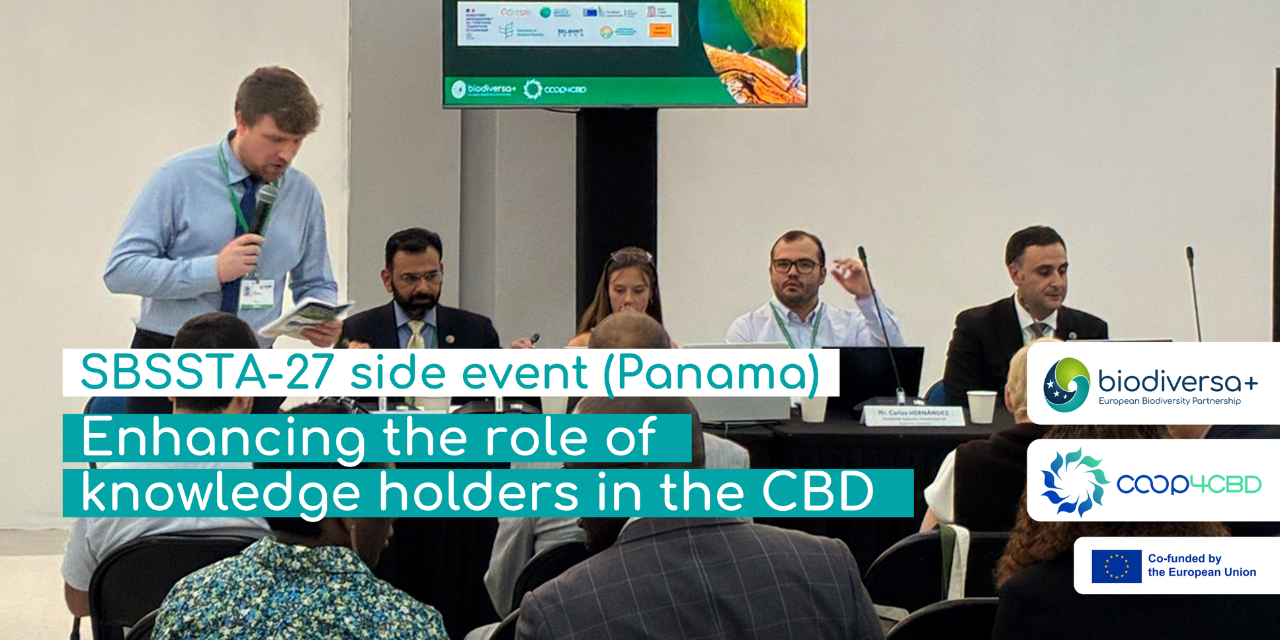Alongside SBSTTA-27, Biodiversa+ and CO-OP4CBD co-organised a side-event on the 24 October dedicated to a topic increasingly central to the Convention on Biological Diversity (CBD): how to better integrate knowledge holders into the Convention’s processes. This dialogue had taken place at a time when there are increasing calls for genuinely evidence-based negotiations in the CBD as well as more capacity-building efforts in support of the implementation and monitoring of the Kunming-Montreal Global Biodiversity Framework (KMGBF) in the context of the 7th National Report.
Bringing science back to the center
The event opened with three high-level keynote speeches that set a clear tone.
- Asad Naqvi (Director of the Implementation Support Division, SCBD) stressed the need to preserve SBSTTA’s scientific dimension and reduce its politicisation. An invitation to bring science back to the core of the process.
- Carlos Hernandez (Co-Chair of the CBD Consortium of Scientific Partners, Humboldt Institute of Colombia) highlighted the role of the consortium and how it mobilises expertise from partner institutions to strengthen scientific, technical, and policy capacities on biodiversity.
- Closing the introduction, Armenia’s Deputy Minister of Environment, His Excellency Mr. Aram Meymaryan, reaffirmed his government’s commitment to ensuring a strong scientific presence at the next CBD COP, which Armenia will host in October 2026.
Capacity-building initiatives
The presentations showcased a broad spectrum of initiatives, from the mobilisation of Indigenous knowledge to transnational scientific cooperation. The message was clear: a comprehensive and inclusive approach to the CBD, based on a plurality of knowledge and stakeholders, is mandatory, as well as a bottom-up dynamic.
Speakers highlighted the work of the Forest Peoples Programme, the Belmont Forum, and three European projects (Biodiversa+, CO-OP4CBD and Respin), all working to reinforce the role of science and increase researchers’ participation in the CBD processes.
This was also an opportunity to introduce the new CBD experts’ guide, now being co-developed by Biodiversa+ and CO-OP4CBD, and to explain how stakeholders will take part in the next stages of this unique document.
The session concluded with a panel featuring four regional Technical and Scientific Cooperation Centers (TSCC Centres):
- the South African National Biodiversity Institute (SANBI) for Africa,
- the Humboldt Institute of Colombia for the Americas,
- the ASEAN Centre for Biodiversity for Asia,
- the Royal Belgian Institute of Natural Sciences (RBINS) for Europe.
Their exchanges highlighted their respective approaches and opportunities for synergy, especially to bridge knowledge gaps and strengthen the science-policy interface. This gathering marked the first time these centres, established at COP16, were able to outline what they will concretely undertake, particularly in terms of capacity building. It also revealed strong potential connections both among them and with the initiatives showcased earlier in the event.
Overall, the side event underscored the importance of connecting the many capacity-building initiatives emerging around the world. Joint activities, such as the CBD guide, illustrate how such collaboration can amplify impact and help bring knowledge holders more effectively into CBD processes.
Co-hosts
This side-event was co-organised by Biodiversa+, CO-OP4CBD, the Ministères Aménagement du territoire Transition écologique, the Helmholtz Centre for Environmental Research, the Joint Research Center (European Commission), the Convention on Biological Diversity, the Belmont Forum, the Forest Peoples Programme, the ICCA Consortium, the Consortium of Scientific Partners on Biodiversity, the Ministry of Environment of the Republic of Armenia, and RESPIN.
24 October 2025, 13:15 EST
NGOs Group meeting room - Ground floor (Panama City)
Biodiversa+ and CO-OP4CBD are proud to announce the co-hosting of a side event to SBSTTA-27 on 24 October in Panama City. This workshop will highlight pioneering capacity-building initiatives from around the world that enhance the role of scientists and knowledge holders in the Convention on Biological Diversity (CBD).
What can you expect from the event?
- Following an introduction on their role in CBD meetings, speakers will present regional experiences, from indigenous knowledge mobilization to transnational research collaboration. They will showcase the new Biodiversa+ and CO-OP4CBD guide presenting different ways to engage successfully in CBD processes.
- A panel featuring perspectives from the Regional TSC Centers (Technical and Scientific Cooperation), followed by an open discussion, will conclude the session, highlighting opportunities for coordination among CBD actors to fill knowledge gaps and strengthen the science-policy interface.
Lunch will be provided.
This side-event is co-organised by the Ministères Aménagement du territoire Transition écologique, the Helmholtz Centre for Environmental Research, the Joint Research Center (European Commission), the Convention on Biological Diversity, the Belmont Forum, the Forest Peoples Programme, the ICCA Consortium, the Consortium of Scientific Partners on Biodiversity, the Ministry of Environment of the Republic of Armenia, and RESPIN.




